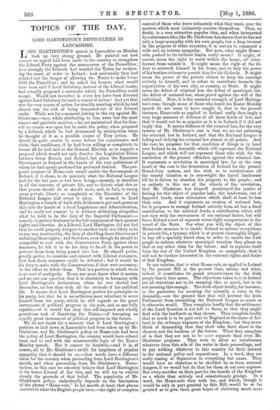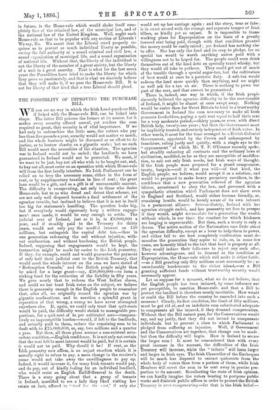TOPICS OF THE DAY.
LORD HARTINGTON'S DIFFICULTIES IN LANCASHIRE.
LORD HARTINGTON'S speech in Lancashire on Monday took up very strong ground. He pointed out how earnest an appeal had been made to the country to strengthen the Liberal Party against the manceuvres of the Parnellites ; how strongly the Liberals had assailed the Tories for weaken- ing the cause of order in Ireland ; how universally they had pointed out the danger of allowing the Tories to make terms with the Parnellites ; and he asked his hearers what would have been said if Lord Salisbury, instead of the Liberal leader, had actually proposed a surrender which the Parnellites could accept. Would not invective in every key have been directed against Lord Salisbury for such a course of action ? And yet that was the very course of action for steadily resisting which he had almost run the risk of being drummed-out of the Liberal ranks. While not for a moment joining in the cry against Mr. Gladstone,—nay, while attributing to him none but the most sincere and patriotic motives,—he yet maintained that for him- self no course was open but to resist the policy when proposed by a Liberal, which he had denounced by anticipation when he thought of it as a possible course of Tory action. He should be quite unable to come before his constituents and claim their confidence, if he had been willing so completely to recant all he had said at the General Election as to support a proposal which would not only dissolve the Legislative Union between Great Britain and Ireland, but place the Executive Government in Ireland in the hands of the very politicians of whom he had openly professed his profound distrust. The pro- posed measure of Home-rule would enable the Government of Ireland, if it chose, to do precisely what the National League had for the last year or two been doing,—namely, to interfere in all the concerns of private life, and to dictate what this or that person should do or should undo, and, in fact, to sweep away private liberty as completely as the Executive of the National League had swept it away. It seemed to Lord Hartington a breach of faith with Irishmen to put such power as this into the hands of a local Legislature and Administration, and he could not consent to it without abdicating altogether what he held to be the duty of the Imperial Parliament,— namely, to protect Irishmen in the full enjoyment of their present rights and liberties. As a Liberal, Lord Hartington did not feel that he could properly delegate to another body, not likely to be in any way trustworthy, the duty of shielding those liberties and enforcing those rights ; and therefore, even though he should be compelled to vote with the Conservative Party against those measures, he felt it to be his duty to do all in his power to prevent them from being passed into law. He should prefer, greatly prefer, to combine and concert with Liberal statesmen, how best those measures could be defeated ; but it would be his duty to unite with the Conservatives, if that were necessary, in the effort to defeat them. That is a position in which there is no sort of ambiguity. Every one must know what it means, and no one can question that it is absolutely in harmony with Lord Hartington's declarations when he was elected last December, no less than with all the avowals of his political life. It means that Lord Hartington prefers his principles to his party, but that he is nevertheless most reluctant to sever himself from his party, which he still regards as the great instrument of political progress in the past, and as one fully capable,—if it would but drop this self-imposed and wholly gratuitous task of dissolving the Union,—of becoming an equally great instrument of political progress in the future.
We do not doubt for a moment that if Lord Hartington's position as laid down in Lancashire had been taken up by Mr. Gladstone, and Mr. Gladstone's policy on Home-rule had been the policy of Lord Hartington, the country would have echoed from end to end with the unanswerable logic of the Easter Monday speech. But it cannot be doubted,—and it is, of °aurae, all to Mr. Gladstone's credit for largeness of popular sympathy that it should be so,—that words have a different value for the country when proceeding from Lord Hartington's mouth, and when proceeding from Mr. Gladstone's. Never- theless, in this case we sincerely believe that Lord Hartington is the better Liberal of the two, and we will try to exhibit clearly the grounds of that belief. The popularity of Mr. Gladstone's policy, undoubtedly depends on the fascination of the phrase "Home-rule." In his mouth at least, that phrase answers to what the English people love,—the right of complete control of those who know intimately what they want, over the matters which most intimately concern themselves. That, no doubt, is a very attractive popular idea, and when interpreted by a statesman who, like Mr. Gladstone, has shown that he has not only a large sympathy with his own people, but a deep interest in the progress of other countries, it is certain to command a wide and an intense sympathy. But now, what might Home- rule, pushed to its farthest limits, really mean ? It might, of course, mean the right to resist within the home, all inter- ference from outside it. It might mean the right of the ill- doer to entrench himself in his home, and to defy the power of his brother-citizens to punish him for his ill-deeds. It might mean the power of the private citizen to keep his earnings entirely to himself, and to refuse to contribute towards the organisation of his own city, or country, or State. It might mean the defeat of criminal law, the defeat of municipal law, the defeat of national law, when pitted against the will of the individual. Now, it is the essential strength of Lord Harting- ton's case, though many of those who heard his Easter Monday speech do not seem to have caught it, that in the present instance, Home-rule as applied to Ireland really does imply a very large measure of defiance of all these kinds of law, and that it would not be so popular as it is in Ireland, if it did not imply this. It means defiance of the criminal law, for the very essence of Mr. Gladstone's case is that we are not enforcing the criminal law in Ireland, and that the National League is foiling and defying the criminal law almost at all points. And the cure he proposes for that condition of things is to hand over Ireland to an Assembly which will represent the National League, and which will not represent those who wish for the conviction of the present offenders against the criminal law. It represents a revolution in municipal law, for at the very heart of the case is the detestation of Ireland for the present Grand-Jury system, and the wish so to revolutionise all the county taxation as to overweight the hated landowner till he is driven to abandon his property to the people ; and so entirely is this one of the objects of the revolution, that Mr. Gladstone has himself proclaimed the justice of finding for this object of popular hate, the landowner, out of Imperial funds, some alternative which shall at least be less than ruin. And it represents an evasion of national law, for it proposes to exempt Ireland entirely from all but a fixed contribution to the national funds, a contribution which will not vary with the onerousness of our national duties, but will leave Ireland a sort of separate water-tight compartment in the vessel of the State. Say what you will, the object of this Home-rule measure is to enable Ireland to enforce everywhere in private life, a tyranny which is at present thoroughly illegal ; to buy off a specially hated class, in order to enable the lash people to enforce whatever municipal taxation they please on that or any other class for the future ; and to separate itself from the rest of the United Kingdom so completely, that it will not be further interested in the external rights and duties of that Kingdom.
In our opinion, that is what Home-rule, as applied to Ireland by the present Bill at the present time, means, and what, indeed, it constitutes its grand attractiveness for the Irish people that it does mean. The objections taken to it in Ireland are all objections not to its meaning this so much, but to its not meaning this enough. The Irish object loudly, for instance, to the guarantee for securing the minority a voice in the Assembly,—on the ground that that will prevent the Irish Parliament from resembling the National League as much as it otherwise would. They complain loudly that the settlement of the Land Question is not left to them, so that they might deal with the landlords as they choose. They complain loudly that so much is to be paid over to England as the share of Ire- land in the ordinary expenses of the Kingdom ; but they never think of demanding that they shall take their share in the chances and the burdens of the future. What they complain of is that they are not to be more separate than even Mr. Gladstone proposes. They wish to allow no interference whatever from this side of the water in their proceedings, and to pay nothing whatever to this country for their interest in the national policy and expenditure. In a word, they are really aiming at Separation in everything but name. Tbey would have no objection to be shielded by us from external dangers, if we would but do that for them at our own expense. But every sacrifice on their part for the benefit of the Kingdom as a whole they actively and ostentatiously grudge. In a word, the Home-rule they wish for, and which, though it would be only in part granted by this Bill, would be so far granted as to give them great hopes of obtaining much more
in future, is the Home-rule which would shake itself com- pletely free of the criminal law, of the municipal law, and of the national law of the United Kingdom. Well, ought such Home-rule as that to be popular with any section of Liberals V We say, No. We assert that the Liberal creed properly re- quires us to protect as much individual liberty as possible, saving the full authority of a sound criminal and civil law, a sound organisation of municipal life, and a sound organisation of national life. Without that, the liberty of the individual is not the liberty of the member of a great society, but the liberty of a unit in a great anarchy. That is what for the last seven years the Parnellites have tried to make the liberty for which they press so passionately, and that is what we sincerely believe that they will make it, if we pass the Home-rule Bill. It is not for liberty cf that kind that a true Liberal should plead.





































 Previous page
Previous page